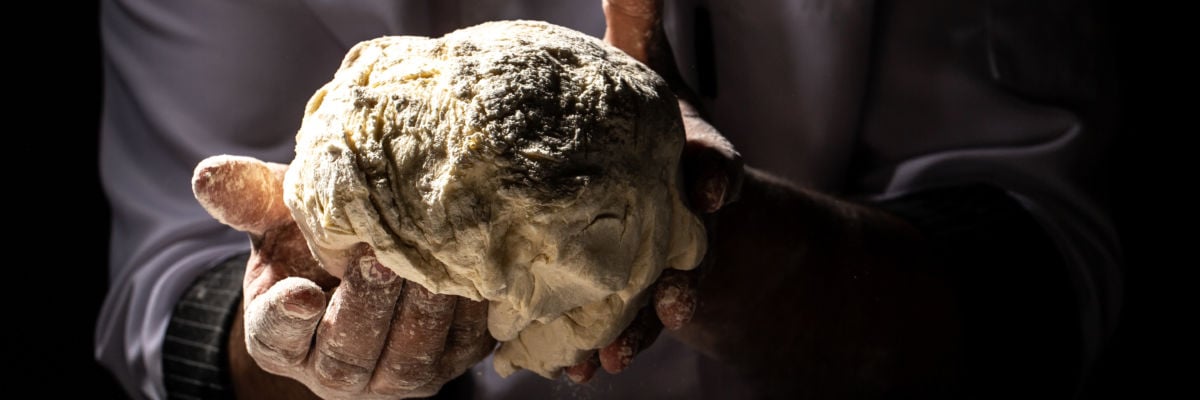
Jesus’ Bread of Life discourse in John 6 is at the heart of the Catholic Church’s biblical justification for the Eucharist. Jesus identifies the “bread which comes down from heaven” (v. 50) as his “flesh” (v. 51) and commands both the Jews and his disciples present to eat his flesh and drink his blood no fewer than six times in six verses (vv. 53-58).
But Protestant apologist Todd Baker thinks such a literal interpretation puts Catholics in a bind. He argues that if Catholics take Jesus’ words about his flesh being the bread of life literally, and that we must eat it, then we must take his words literally in John 6:35, where he says, “I am the bread of life; he who comes to me shall not hunger, and he who believes in me shall never thirst.” For Baker, Catholics should believe they will “never physically hunger or thirst again once they have [eaten the Eucharist] for the first time.”
“Obviously this does not happen,” Baker goes on to argue. Based on this, he concludes, “Christ was speaking spiritually here to metaphorically illustrate by comparison and contrast that He, as the Spiritual ‘Bread of Life,’ gives eternal life and sustains our spiritual life when received by faith in the same manner.”
Let’s see how we might respond to Baker’s objection and show that it doesn’t put Catholics in the bind that Baker thinks it does.
One response is to turn the tables and show that Baker’s own view is not exempt from the logic of his counterargument. Here’s Baker’s logic:
Premise 1: If the Catholic view of literal eating were true (eat the bread of life which is his flesh), then there would be the physical effect of no hunger or thirst.
Premise 2: Catholics say their view of literal eating is true (eat the bread of life which is his flesh).
Conclusion 1: Therefore, there must be the physical effect of no hunger or thirst.
Premise 3: But Catholics still hunger and thirst.
Conclusion 2: Therefore, the Catholic view of literal eating isn’t true.
Now, Baker interprets Jesus’ words “he who comes to me” in John 6:35 to mean “those who come to Christ with personal faith” (emphasis added). And this faith is not symbolic. It’s real and literal faith.
So, according to Baker’s logic, if literal eating demands a physical effect, then literal believing would demand a physical effect as well. Why would Baker’s literal faith not demand the physical effect of no physical hunger or thirst, whereas literal eating would? To say literal believing doesn’t entail a physical effect would be to apply a double standard. Therefore, according to Baker’s logic, true believers also would never physically hunger or thirst.
But as Baker himself acknowledges, that’s not what Jesus is saying. He writes, “Of course, Jesus was not literally saying that if a person believes on Him he or she would never physically hunger or thirst again.”
Therefore, to be consistent, Baker must reject the premise that the Catholic view of literal eating requires the physical effect of no hunger or thirst.
Baker attempts to put Catholics in between a rock and hard place only to squeeze in with them. Either he concedes the same absurd conclusion that he thinks the Catholic interpretation leads to (the physical effect of no hunger or thirst), which would defeat his own interpretation, or he allows the Catholic interpretation to stand without an absurd conclusion (literal eating without the physical effect of no hunger or thirst), in which case his argument is a non-starter.
Another problem with Baker’s argument is that premise one above is a non sequitur (Latin, “it does not follow”). There’s nothing in the literal act of eating that precludes a spiritual effect and demands only a physical one.
First, we’re already within the context of supernatural revelation here, so it’s no stretch of the imagination that Jesus could command us to eat and there be a spiritual effect.
Second, we have another example in the Bible where a physical act of eating brings about a spiritual effect: Adam’s and Eve’s act of eating the fruit of the tree of knowledge of good and evil (Gen. 3:6). God promised they would die if they ate of the tree (Gen. 2:17). After they ate, they died spiritually, symbolized by God casting them out of the garden (Gen. 3:23-24). If Adam’s and Eve’s literal act of eating brought about a spiritual effect, then the literal act of eating the bread of life, which is Jesus’ flesh, can bring about a spiritual effect, too.
Now, it’s true Adam and Eve died physically as well. But that doesn’t take away from the fact that a literal act of eating brought about a spiritual effect, which is all we need to refute Baker’s argument that a literal act of eating demands only a physical one.
This parallel between the act of eating Jesus’ flesh and Adam’s and Eve’s act of eating in the garden is supported by the fact that Jesus alludes to the Garden in John 6:58. He says, “He who eats this bread [his flesh] will live forever.”
Bible scholars Curtis Mitch and Scott Hahn comment on the significance of the phrase “will live forever”:
The expression occurs rarely in the Bible, only twice in John (6:51, 58) and once in the Greek version of Gen 3:22. A comparison is thus implied between the Tree of Life, which bore the fruit of immortality, and the Bread of Life, which tradition calls the “medicine of immortality.”
Just as Adam’s and Eve’s literal act of eating brought about a spiritual effect (spiritual death in their case), so too the literal eating of Christ’s flesh in the Eucharist brings about a spiritual effect: eternal life (“He who eats my flesh and drinks my blood has eternal life” [John 6:54]).
A third example of how the literal act of eating doesn’t preclude a spiritual effect is Paul’s sobering instructions concerning the partaking of the Eucharist. He writes in his first letter to the Corinthians, “For anyone who eats and drinks [the bread and cup of the Lord—v. 27] without discerning the body eats and drinks judgment upon himself” (11:29). Elsewhere, Paul uses the Greek word for “judgment,” krima, to connote damnation:
- “Having damnation [Gk.—krima] because they have made void their first faith” (1 Tim. 5:12—Douay-Rheims).
- “Therefore he that resisteth the power, resisteth the ordinance of God. And they that resist, purchase to themselves damnation [Gk.—krima]” (Rom. 13:2—Douay-Rheims).
Since the physical act of eating the Eucharist can bring about spiritual death, if done so in an “unworthy manner,” then surely eating the Eucharist in a worthy manner can bring about spiritual fulfillment and doesn’t require a literal physical effect.
One last response to Baker’s argument is that, in a way, he’s right! There is a sense in which we will literally not hunger or thirst by virtue of eating Jesus’ body: in our glorified bodies. Jesus promises, “He who eats my flesh and drinks my blood has eternal life, and I will raise him up at the last day” (John 6:54). There will be no hunger or thirst for us in our glorified bodies in heaven. Since Jesus connects eating his flesh to being raised to such a state in our glorified bodies, it follows that eating Jesus’ flesh is also connected with literally not hungering or thirsting.
Baker’s counterargument is inventive. But back to the drawing board he must go, because this one fails. A Catholic’s literal reading of Christ’s instruction to eat his flesh therefore stands justified.



